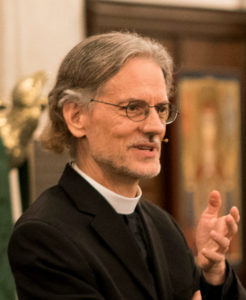The Christ Child in Carols—and in Us
The traditional Nine Lessons and Carols opens with the carol “Once in Royal David’s City.” The words were written by Cecil Frances Alexander in 1848; they first appeared in the U.S. in Cantica Sacra, Hymns for the Children of the Catholic Church, in 1865. In the lessons and carols service, a single boy treble sings the opening stanza unaccompanied; gradually everyone else joins in—which is to say, it ends up not a children’s hymn, but one sung by all of us.
After participating in this service, a young priest in Dallas spoke of the remarkable words we had just sung. Although in contemporary hymnals the words of many hymns have been changed (sometimes for good reasons, sometimes not), we had sung older versions—with which he was not familiar. For instance, the third stanza of “Once in Royal David’s City” speaks of Jesus’ growth in childhood in this way: “And, through all his wondrous childhood, / He would honor and obey, / Love, and watch the lowly maiden / In whose gentle arms he lay.” The baby in his mother’s arms is watching the woman he will honor, obey, and love though all his childhood, a childhood that is “wondrous.” The stanza concludes with a call to all Christian children to be “mild, obedient, good as he.”
But this is not a hymn in which adults are telling this to their children! No—and here’s the wonder my friend was seeing—the hymn speaks of all who are singing it as children. That is to say, in singing it we put ourselves in the place where children are. The next stanza begins: “For he is our childhood’s pattern.” “Our” childhood, the childhood of those who are singing, the childhood that is our present reality! We continue: “Day by day like us he grew; / He was little, weak, and helpless, / Tears and smiles like us he knew. / And he feeleth for our sadness, / And he shareth in our gladness.”
Children know the mixture of life already—it is not an adult secret. What mixture do I mean? That of “tears and smiles.” Children also know something adults forget: In the big world around us, in the universe; we are fundamentally “little, weak, and helpless.” Adults have not become masters of the universe; at most, and at worst, they have just forgotten who they are. Yet things are not hopeless. Children grow; day by day Jesus grew; we who sing this carol at Christmas can grow still.
* * * * *
May I commend to my readers’ meditations this observation, put in our minds at Christmas, that God would have us all for his children, and that the difference between being six or 16 or 36 or 66 or 96 is not, really, a very big difference? Think of this next time you sing “Away in a Manger.” In the middle of the second stanza, you will make a statement of personal faith: “I love thee, Lord Jesus!” And then, if you follow the version I learned as a boy, you will pray, “Look down from the sky, and stay by my cradle till morning is nigh.”
Tonight, you may sleep in a queen-size bed, with soft sheets, many pillows, and warm comforters. Even if so, your bed remains but a cradle. That Babe in the manger, watching his “lowly” mother—he has come to stay by us till all darkness is past. And he will stay by us—vulnerable in our cradles, living with both sadness and gladness—till the great morning, which will come at the last, is nigh.










